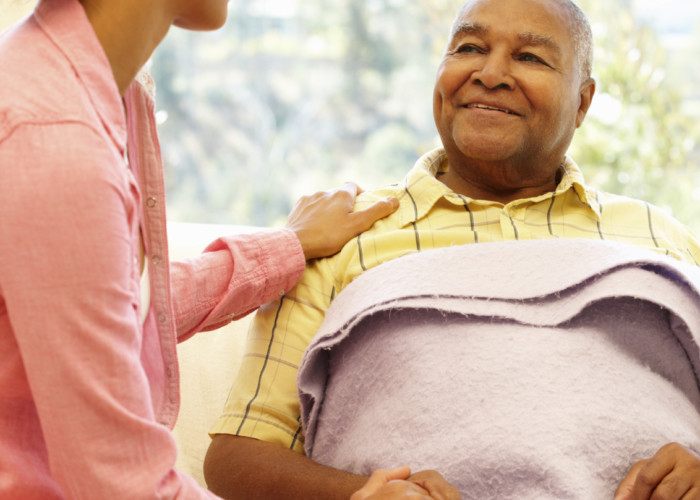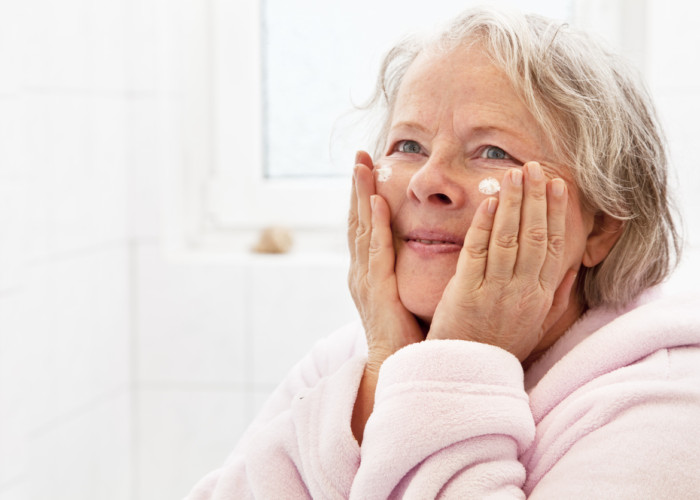caregiving
Teri… We Love You so Very!
Please join us in congratulating Teri as our Caregiver of the Month!
This week, we were excited to surprise Teri on shift with our Caregiver of the Month award. Teri was so pleased that she expressed her excitement with a happy dance! Peter, Teri’s current client, was very complimentary of Teri and happy to be a part of the celebration too!
Teri has worked with Hired Hands for almost two years now. She is extremely skilled in providing care, and is on our specialized Dementia and Hospice teams. Teri has worked on some of our most complex cases, and always steps into her day with a beautiful, warm smile on her face. She is providing compassionate Live-in care on a 24 hour basis. Teri is extremely caring and gentle with her clients – always willing to help!
What do you say Teri? “To be … Read More »
How Is Caregiving Different for Male Caregivers?
A different support system is often needed for male caregivers.
If you painted a picture of a typical family caregiver, you’d probably portray a middle-aged woman, perhaps cooking and serving a meal, assisting with baths or getting dressed, an transporting a loved one to doctors’ appointments. And this assessment would be accurate; AARP reports the typical caregiver profile is a 49-year-old female helping with acts of service such as these for a 69-year-old female relative who is facing long-term health concerns.
Yet there’s a growing trend of male caregivers stepping into – or sometimes, falling into by default – this crucial role: nearly 40% of all caregivers, as a matter of fact. And though there are some trending differences in caregiving difficulties between the genders (such as a greater likelihood of discomfort for men in helping with personal hygiene tasks), … Read More »
The Impacts of a Stroke on Brain and Functionality
Understanding the impacts of a stroke can help caregivers create the most appropriate plan of care.
A stroke is a difficult experience to encounter, and no two individuals are impacted in the same way. While some stroke survivors will have few, if any, lingering effects post-stroke, for many, a stroke will be a life-altering event that results in weakness, numbness, or paralysis on one or both sides of the body. The impacts of a stroke can be evident in the individual’s coordination and balance, as well as result in changes in behavior and judgment.
Comprehending why a stroke survivor is acting a certain way or experiencing particular symptoms can often help caregivers create the most appropriate plan of care. Below are just a few ways that having a stroke might impact a person’s brain and level of functionality.
A stroke in … Read More »
Keeping Seniors Safe: These Warning Signs Can Indicate That Help Is Needed
It’s holiday time once again, which means it is also the perfect time for a “holiday reality check.” If you haven’t seen your elderly loved ones in a while, now is a good time to examine how your senior loved ones are doing and take the necessary steps in keeping seniors safe. With frenzied lifestyles or long distances separating families for a lot of the year, subtle (or not-so-subtle) indicators can very easily be overlooked. Keep a lookout for the following indications that additional care could be required, and bear in mind that looking for warning signs is not for the purposes of judgment or critique; it’s a check for wellness, well-being and safety.
Physical appearance: An unusually disheveled appearance of a senior loved one may be discovered during a holiday visit. Failing to stay up with daily hygiene routines such … Read More »
3 Crucial Steps to Ensure Medication Adherence in Seniors
Are your elderly loved ones currently taking prescribed medications? Are you certain they’re taking them exactly as prescribed? Research shows that the typical senior is taking a multitude of prescription meds – as many as 15 – 18 of them each and every day. And, as many as 55% of those prescription medications are not being taken correctly for a variety of reasons, with serious repercussions. Knowing as much as possible about your own prescriptions and those your older loved ones are taking can help eliminate the potential for dangerous medication mishaps and allow for the optimum benefits of the medications.
Below are several tips to help ensure proper medication adherence.
Get the answers you need. Don’t be afraid to ask the health care provider and/or pharmacist any and all questions you may have about the prescription. Ensure you know the following:
The … Read More »
Medication Management Strategies You Can Implement Today to Keep Seniors Safe
All of us recognize that medications can save lives, but most of us have heard frightening stories about patients who have received incorrect medication – either as a consequence of an issue with the physician or pharmacy. What many people don’t consider is that there is a concealed hazard even when we get the correct medication — the risk of non-adherence.
Similar to driving down the wrong side of the road, incorrect medication management is dangerous. In fact, it is more so — as many as 125,000 people die every year due to prescription medication non-adherence, double the number who die in auto accidents. Although many people might think they are following the rules when it comes to their medications, medication adherence mistakes arise frequently. These mistakes include:
Failure to fill or refill a prescribed drug
Missing one or multiple dosages
Taking the wrong … Read More »
Overcoming Bathing Care Battles with a SMILE
Take a moment to close your eyes and picture yourself like this: You’ve spent most of your life taking care of and assisting others – as a mother or father, in your career, through volunteering in your community, and as a grandparent. After all those years of living independently and being in control of your life’s decisions, you’ve suddenly aged to the point that now you are the one in need of assistance with bathing and other care tasks. Imagine the sense of loss, vulnerability, and fear.
If you’re taking care of a senior loved one, it can help to put yourself in his or her shoes when facing challenges related to helping the person with personal care tasks. The struggles your older loved one is feeling are real, and a little empathy and patience can go a long way towards … Read More »
Elderly Personal Care Includes Skin Care: Tips to Enhance the Health of Aging Skin
It’s not an aspect of elderly personal care that’s as commonly discussed as other tasks, but is crucial to keeping seniors healthy nonetheless. Aging skin care issues can cause a wide variety of distress for seniors, including discomfort, bruising, dryness, itching, and more.
The home care professionals at Hired Hands Homecare work hard to keep older adults safe and healthy from head to toe, and that includes healthy skin. We’ve outlined below some of the more common skin difficulties in aging, and some suggestions to help.
Dryness
According to Medscape, an overwhelming majority of adults over age 65 are troubled by dry, flaky, itchy skin, which results from a reduction in sweat and oil glands.
How to help:
The senior should take less frequent showers or baths, using warm (not hot) water, gently dry the skin, and apply moisturizer
See if “dry bath” products work … Read More »
Keeping Bathroom Safety a Priority in Honor of National Bath Safety Month
How could something that’s so comforting and soothing, like a nice, warm bath, be one of the biggest dangers to older adults? The truth is, combining smooth surfaces, slippery soap and hot water create the perfect storm for a fall danger – one of the most severe risks to aging adults.
January is designated as National Bath Safety Month, and it’s a great chance for both education and assessment to ensure the utmost bathroom safety for your senior loved ones.
The Consumer Product Safety Commission reports that about 370 people of all ages suffer bathtub or shower-related injuries each day in the United States. Because most falls in the house take place in the bathroom, AARP recommends taking the following precautions:
Install grab bars for the toilet, shower, and bathtub
Install non-skid tile or use non-skid bath mats
Set the temperature of the home’s hot … Read More »
How to Turn Bathtime Personal Care Battles into Bliss
What feels finer than sinking into a warm, relaxing bath at the conclusion of a long, busy day? While most of us relish the luxurious comfort that bathtime brings, for seniors, especially those struggling with the challenges of dementia or Alzheimer’s disease, it’s certainly not blissful.
For many different reasons, such as memory issues, feelings of vulnerability, or physical distress from the pressure or temperature of the water, helping a senior with the personal care tasks of bathing can feel a lot more like entering a battleground.
Hired Hands Homecare of California wants to help restore the joy of bathtime for both the senior and his or her caregiver with these ideas:
Ensure safety. Keeping the bath area free from hazards is critical. Make certain that:
Grab bars and mats that are slip-resistant are strategically placed in and around the tub
The water temperature is … Read More »

















